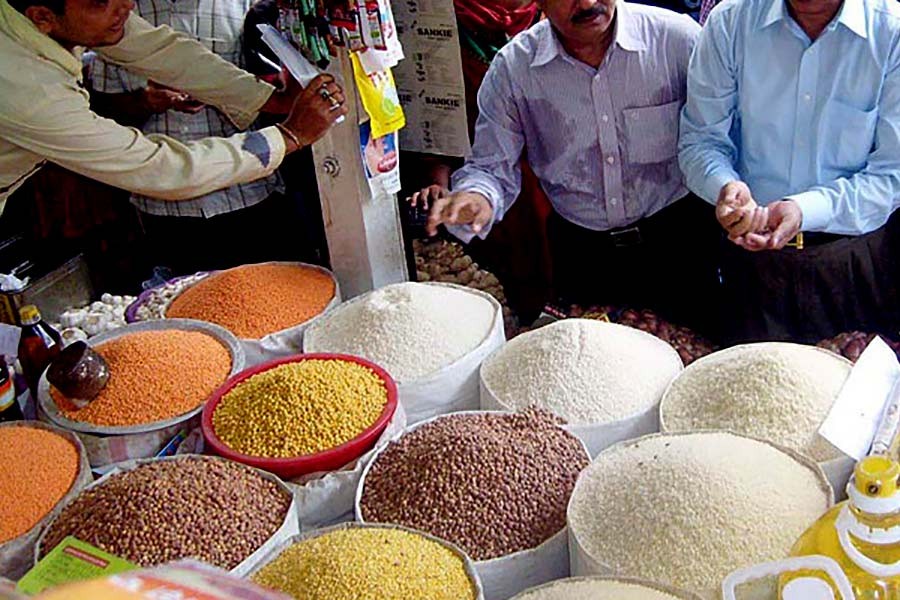
Published :
Updated :

Prices of some essential items, including onion and sugar, have shoot up ahead of the holy month of Ramadan. The price of local variety of onion has recorded 60 per cent rise in 10 days. Besides, prices of fish, poultry and vegetables have also recorded unexpected rise.
As usual, the same old story of blame game surfaced again at the start of the holy Ramadan. The wholesalers and retailers blamed each other for gaining excessive profit. Not only that, they also issued contradictory statements over the price hike of essential commodities in the market.
They also blame the government for failing to take effective measures for freeing the Dhaka-Chattogram highway from severe traffic congestion in order to ensure quick movement of essentials imported from India to help keep prices under control.
Commerce Minister Mr Tofail Ahmed said this week that the government has sufficient stocks of essential items to meet the consumers' demand during the fasting month. Prices of essentials are now stable in the local market barring sugar and onion. He claimed the sugar price has started declining in the international market.
The consumers are visibly worried over the volatile commodity market in the absence of strict vigilance by the government. No effective action is in sight. Cracking down unscrupulous traders to control prices of essentials before Ramadan has become urgent. The Special Powers Act should be enforced against unscrupulous traders, if necessary, for conducting crackdown operations.
According to the Department of Agricultural Marketing (DAM) survey on 34 essentials and Trading Corporation of Bangladesh (TCB) price chart, most of the retailers in the city have been selling products at rates higher by 8.0 to 166 per cent than 'logical'. Both the city corporations displayed charts at all kitchen markets in the city, based on the 'logical price list'.
The government had enacted, over the years, many laws including Consumers' Rights Protection Act 2009, Competition Act 2012, Safe Food Law 2013 and Formalin Control Act 2015. Enactment of these laws has, indeed, made a legal framework for protecting consumers' rights. But infrastructure and procedure of operation are yet to develop to implement such laws, observers say.
This has been a common practice that every year people are assured by the government that the prices of essential commodities would definitely be brought under control. Several initiatives are also taken by the authorities in this regard. A number of special administrative teams, for instance, function in different marketplaces to make sure that no corrupt forces can take control of the markets. Intelligence agency also remains active in order to tackle any artificial crisis created by the syndicates.
Despite these measures, it is still a matter of great concern that the prices of a number of daily essentials do still manage to go up as soon as Ramadan arrives. To gain more and more profits, some unscrupulous and greedy traders store goods to make artificial crisis in the markets. During the month of Ramadan, greedy traders engage themselves in increasing prices through some local and district-level syndicates.
As a consequence, unreasonable price hike of the essentials in the market is causing untold sufferings to the common people, particularly those from lower strata. What the government can do is to bring the importers, wholesalers and even the retailers, under a regular consultative process to keep prices from rising.
There is no denying that the rising price of food items appears to be the outcome of the authorities' inability to respond to the worrying trend of market manipulation. Unscrupulous traders continue to take advantage of the high demand for certain food items during this season while blaming other factors for it. Market operation by the state-run TCB is failing to leave any impact on the market as it supplies less than 1.0 per cent of the total demand.
When the commerce minister claims that supply of food items that are widely consumed during the month of Ramadan is more than enough to meet the expected demand, then how does one explain price hike?


 For all latest news, follow The Financial Express Google News channel.
For all latest news, follow The Financial Express Google News channel.